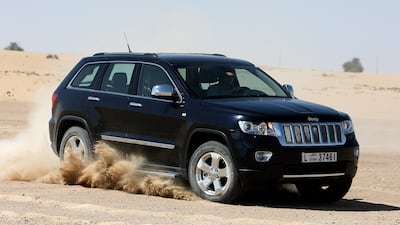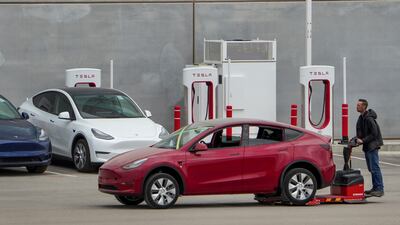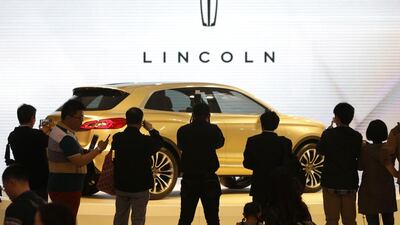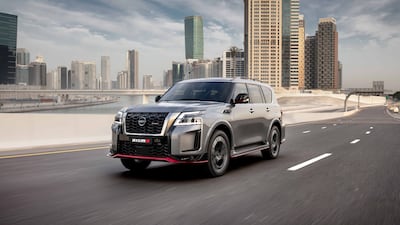They are known to be sturdy. But Land Rovers could present problems for their owners when it comes to car faults, a survey has found.
Researchers at JD Power, a consumer data analytics company, this year released an annual dependability study for vehicles based on the feedback from 30,062 owners of vehicles that are three years old.
Within the first three years these vehicles had to be fixed on average 1.86 times each, the survey said.
Also propping up the bottom of the list were Lincoln, Audi, Ford and Mercedes-Benz.
car comparison site Drive Ninja
Top of the list was Lexus, with only 1.33 problems within three years, with Genesis and Kia rounding out the top three.
Mitsubishi, Toyota and Nissan all made the top 10, and sitting in the middle of the table were Jeep, Honda and Mazda.
Scroll to the bottom for a list of the top three cars in each category.
Used car durability
The JD Power 2023 US Vehicle Dependability Study looked at three-year-old models of various brands to see how they are performing in terms of quality, component replacement and whether they still appeal to the owner.
Results were measured in how many problems were encountered per 100 cars of that make and model.
This year, the study showed an industry average of 186 problems per 100 vehicles (PP100), six fewer than 2022.
Kia ranked highest in the mass market segment for a third consecutive year, followed by Buick, Chevrolet, Mitsubishi and Toyota.
For premium brands, Lexus was joined at the top of the list by Genesis, Cadillac and BMW.
Tested for desert conditions
The study’s findings could easily be applied to the UAE, given the similarity between the regions, said a Dubai-based expert.
“Large parts of the US, especially in the mid-south with the desert conditions, are not too dissimilar to the UAE,” said Adam Whitnall, chief executive of car comparison site Drive Ninja.
“A lot of models that are built for the US market are going to do well here because of what they are tested for.”
The main concern with keeping a car running on UAE roads is how it handles the heat and dust, said Mr Whitnall.
“The wear and tear on cars is more intense here than in most markets because the high dust content plays havoc, especially when it gets sealed into parts of a car,” he said.
“The failure rate of parts is much higher here which is why many insurance companies will only cover cars that are seven-years-old or newer.“
The rate of deterioration is much faster than in other markets due to the extreme weather conditions for most of the year.
There was a distinctly Asian leaning in the cars that Mr Whitnall said would be best for the region.
“The study is pretty spot on for what we see out here in the UAE,” said Mr Whitnall.
“The Korean brands rank highly here, as do Toyota, Lexus, Mitsubishi and Nissan.”
Technology prone to issues
The survey showed mass market brands led the way in improvements with 182 PP100, eight fewer than a year ago and 23 fewer than premium brands. The 23 PP100 gap between mass market and premium brands is the widest since the study began 34 years ago.
This is attributed to the increased amount of technology in premium makes of car, which leaves them more susceptible to problems.
Some of the most common problems from 90 days to three years of ownership are starter battery failures, outdated maps, Android Auto/Apple Car Play and voice recognition issues.
The infotainment category continued to be the most problematic, with an average of one in two cars suffering a problem, which is almost double the amount of the next highest category, exterior.
Six of the top 10 problem areas in the study were infotainment-related, including built-in voice recognition, Android Auto/Apple CarPlay connectivity, built-in Bluetooth system connectivity, touchscreen/display screen difficult to use, not enough power plugs/USB ports, and navigation system inaccurate/outdated map.
When it came down to individual models, the Toyota C-HR and Lexus RX were the highest-ranked models in the study, each with 111 PP100. Both models showed improvement in eight of the nine problem categories from a year ago.
Brands that are taking product improvement seriously are those with the biggest reduction in PP100. This year they were Ram (77 PP100 improvement), Volvo (41 PP100 improvement) and Nissan (35 PP100 improvement).
Tesla was officially included in the study for the first time this year, with a score of 242 PP100. However it was ineligible for ranking because the company did not provide researchers with owner information.
The study was based on responses from 30,062 original owners of 2020 model-year vehicles after three years of ownership.
The study was carried out from August through November 2022.
Top three models per category
Compact car
- Kia Forte
- Toyota Corolla
- Hyundai Elantra
Compact premium car
- BMW 4 Series
- Volvo S60
- BMW 3 Series
Midsize car
- Kia Optima
- Chevrolet Malibu
- Ford Fusion
Compact SUV
- Kia Sportage
- Buick Envision
- Jeep Cherokee
Midsize SUV
- Chevrolet Blazer
- Hyundai Santa Fe
- Ford Edge
Small SUV
- Toyota C-HR
- Buick Encore
- Chevrolet Trax










